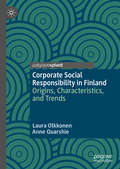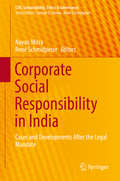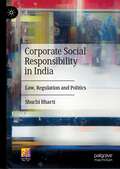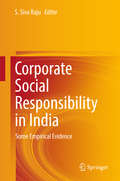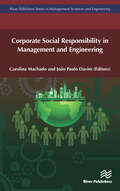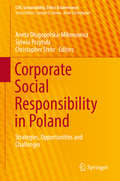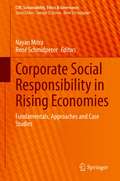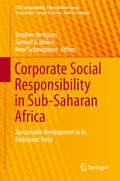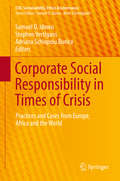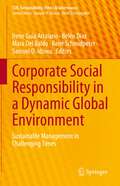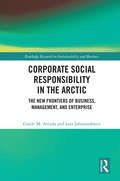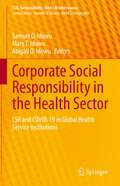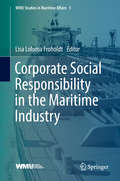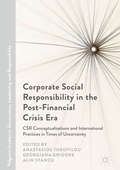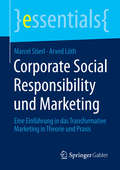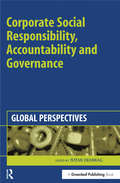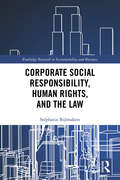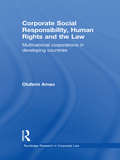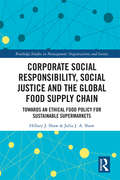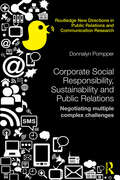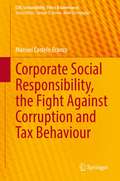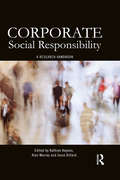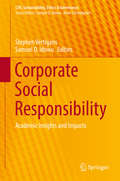- Table View
- List View
Corporate Social Responsibility in Finland: Origins, Characteristics, and Trends
by Laura Olkkonen Anne QuarshieThis book introduces a Finnish approach to corporate social responsibility (CSR) and embeds it within a broader discussion on the Nordic roots of business responsibility and stakeholder thinking. The first part of the book traces the origins of Finnish CSR from paternalism at the beginning of industrialization to the start of the welfare state. The second part discusses the characteristics of Finnish CSR in light of the cultural and societal context and structure, and the third part introduces current trends and challenges. Each section of the book includes case examples that illustrate Finnish CSR from different perspectives. The book will be of use to scholars and students with an interest in the Nordic approach to CSR.
Corporate Social Responsibility in India: Cases and Developments After the Legal Mandate (CSR, Sustainability, Ethics & Governance)
by René Schmidpeter Nayan MitraThis book provides a comprehensive overview of Corporate Social Responsibility (CSR) in Indian corporations following the 2013 legal mandate on corporate spending of profits for CSR. Bringing together authors hailing from diverse walks of life, the book pursues a 'hands-on' approach, with real-world case studies and examples that help the reader feel the dynamic pulse of India immediately after the ratification of the CSR mandate in the Companies Act, 2013. The Act is expected to affect over 16,300 companies with an estimated flow of approximately 200 billion Indian rupees into the economy every year, thus shaking the foundations of business and society and impacting the country at multiple stakeholder levels. As a result, India is likely to become the birthplace of social, economic, and environmental transformation through financial investments in CSR! In order to insightfully reflect on this transition, this book has been divided into three parts. The first part presents the CSR mandate and its implications, while the second focuses on its implementation and the third part provides a view on the way forward. The book helps to reveal the various layers of CSR in an emerging economy like India and is expected to spark debate, discussion and research among policy-makers, consultants, academics, practitioners and other stakeholders the world over, which will further expand its contribution to CSR literature and open up new vistas in CSR research. "This is indeed a first of its kind book and marks a watershed in the journey of CSR. It is an extremely important contribution to the body of knowledge in the area of CSR and Corporate Goverance in emerging economies that is driven by a completely different set of challenges, opportunities and requirements from that of developed economies. " Dr. Bhaskar Chatterjee, Director General & CEO, Indian Institute of Corporate Affairs
Corporate Social Responsibility in India: Law, Regulation and Politics
by Shuchi BhartiThe book explores how the influence by the corporate sector in the economic interactions globally leads to the international governance framework pertaining to CSR, that is primarily based on soft law attributes. Such international soft law regime uniquely influences the way the legal regime around CSR has shaped up in India. Through innovative methodology, the analysis of regulatory space and instruments and the structural framework construe the relationship between state and corporate sectors. It is necessary to investigate the two-fold relationship of state and corporate actors. The book takes up a regulatory, institutional and socio-political investigations through studying the case of CSR in India in the backdrop of the transformations taking place in national arena, its international inspirations and resulting regulatory model that evolve. How the existing regulatory space is affected? What are the implications on the regulatory instruments? The pursuit of the answers would also involve investigation of questions as to how the state-corporate relationship constructed, construed and conducted post state’s ratification of CSR. What are the reasons of such changes? What implications do the role of politics and corporate strategies have on the renewed interest in CSR? The book deals with these aforementioned aspects. This scholarly work synthesizes political, economic and legal aspects of the role of the state and corporate sector with narrowly defined focus of CSR which has the ability to provide a comprehensive broad-brushed account of the larger framework.
Corporate Social Responsibility in India: Some Empirical Evidence
by S. Siva RajuThis book presents the authors' recent field experiences of corporate social responsibility (CSR) activities in different regions of India. It also demonstrates how social auditing and stakeholder mapping help analyze the impact that particular individuals or groups may have on the functioning of any company in an area. CSR is a rapidly growing area of research and activity, especially in developing countries like India. An increasing number of companies are realizing their own social responsibility, given that they work within societal networks. As a result, any initiation or expansion activity they carry out in society impacts the communities around them. Given the newness of the field, the work on CSR in India is still in the initial stages. Most importantly, there is a need to highlight issues concerning CSR activities using sound methodologies and scientific data. A database comprising qualitative and quantitative approaches collected by tracking CSR activities is invaluable. Further the scientific data is vital to fully understand CSR, and in turn helps in designing appropriate and effective interventions for improving community members' quality of life. Accordingly, the stakeholders associated with CSR need to have a sound knowledge of how to conduct studies related to baseline data generation, community needs assessments, community profiling, stakeholder mapping, social impact assessments, monitoring and evaluation, as well as the social auditing of CSR projects and other related issues. This book aptly covers these issues and offers supporting empirical evidences from the field.
Corporate Social Responsibility in Management and Engineering
by Carolina Machado; João Paulo DavimReferring to an organizations responsibility for their impact on society, corporate social responsibility (CSR) is greatly relevant for the competitiveness, sustainability and innovation in the management and engineering arena of organizations, and the economy worldwide. Taking in account its these concerns, Corporate Social Responsibility in Management and Engineering covers the issues related to corporate social responsibility in management and engineering in a context where organizations are facing, day after day, high challenges for what concerns issues related to their social responsibility. The book looks to contribute to the exchange of experiences and perspectives about the state of the research related to CSR, as well as the future direction of this field of research. It looks to provide a support to academics and researchers, as well as those that operating in the management field need to deal with policies and strategies related to CSR.
Corporate Social Responsibility in Poland: Strategies, Opportunities and Challenges (CSR, Sustainability, Ethics & Governance)
by Christopher Stehr Aneta Długopolska-Mikonowicz Sylwia PrzytułaThis book examines the development and adoption of corporate social responsibility (CSR) in Polish businesses and social and environmental organizations, and analyzes the corresponding impact at the strategic and operational level in these fields. It presents the status quo of CSR in Poland from three main perspectives: The first presents theoretical works based on current research and recent advances, while the next takes a closer look at empirical findings in the different fields of CSR (e.g. finance, reporting, law) and presents best practices from major international companies operating on the Polish market. Lastly, it presents a range of case studies from small and medium companies and NGOs in Poland and gives an outlook on the future development.Readers will benefit from an in-depth discussion of the opportunities and challenges that businesses and organizations in Poland are currently facing with regard to traditional national values and the influx of new cultural and social dimensions and patterns produced by international businesses entering the Polish market. Taken together, the lessons learned, case studies and snapshots of the latest developments provide a comprehensive overview of the state of the art of CSR in Poland, as well as a blueprint that can be applied to other Eastern European countries.
Corporate Social Responsibility in Rising Economies: Fundamentals, Approaches and Case Studies (CSR, Sustainability, Ethics & Governance)
by René Schmidpeter Nayan MitraEmerging economies arguably have different socio-fiscal dynamics compared to developed economies. On one side they have the need for corporate interventions in national development, on the other hand, they do not have enough research to support the agenda. In recent times there has been a conscious effort to legislate Corporate Social Responsibility (CSR) in some of these countries in order to bring about sustainable development. Yet, it is this legislation, which is debated among many others.This book provides its readers with a comprehensive interpretation of the various CSR perspectives in emerging economies through academic research and case studies from practice. It not only points out the challenges, the debates, but also the dynamics of implementation and the impact of such CSR spent. This book therefore is targeted both towards academics as well as practitioners in an attempt to bring about an active academic-industry interface as CSR as a management function is part of dynamic social science.
Corporate Social Responsibility in Sub-Saharan Africa: Sustainable Development in its Embryonic Form (CSR, Sustainability, Ethics & Governance)
by Samuel O. Idowu Stephen Vertigans René SchmidpeterThis book provides a comprehensive overview of corporate social responsibility and its development in Africa. It provides in-depth studies on 11 sub-Saharan countries, demonstrating that corporate social responsibility is forming and going through different stages of metamorphosis in the continent. Though corporate and individual attitudes towards sustainability in Africa still leave a lot to be desired, this book showcases how things are rapidly changing for the better in this regard. It demonstrates and provides evidence for the fact that corporate social responsibility contributes significantly to the way sub-Saharan African economies are being transformed, with service sectors expanding, commercial activities diversifying and industrial bases growing through the initiatives of small, medium and large organizations and innovators supported by widespread higher-education program rollouts. The book highlights how progressive and wide-ranging CSR approaches have emerged, and how much they differ from the obsolete approaches of the past, which promulgated negative stereotypes, marginalized communities and positioned them as victims or beneficiaries of development.
Corporate Social Responsibility in Times of Crisis: Practices and Cases from Europe, Africa and the World (CSR, Sustainability, Ethics & Governance)
by Samuel O. Idowu Stephen Vertigans Adriana Schiopoiu BurleaThis book explores national and transnational companies' Corporate Social Responsibility (CSR) activities in times and settings in which they are confronted with economic and social challenges and analyzes these situations, ranging from the financial crisis to fourth generation sustainability. Presenting a number of different cases from various parts of Europe, North America and Africa, it showcases how companies respond to the challenges of the development, consultation, implementation, integration, measurement and consolidation of CSR. Further it specifies how these corporations deal with uncertainties over corporate and financial resources, global financial stability and growing evidence for climate change. The book describes CSR adaptation under challenging circumstances and argues for the strategic and operative legitimation of Corporate Social Responsibility in times of crisis.
Corporate Social Responsibility in a Dynamic Global Environment: Sustainable Management in Challenging Times (CSR, Sustainability, Ethics & Governance)
by Samuel O. Idowu René Schmidpeter Mara Del Baldo Irene Guia Arraiano Belén DíazThis book highlights the latest research on responsible business and its practical implications for the economy, society, academia, and politics. It presents selected contributions from respected scholars and experts who have conducted international research on corporate social responsibility, sustainability, ethics, corporate governance, finance, and responsible investing. The book examines the spreading and enhancement of CSR and sustainability at the micro, meso, and macro levels, especially in light of their increased relevance following the recent pandemic. Taken together, the results of the empirically and theoretically based contributions offer a unique and multi-faceted perspective on current global trends and expected developments in this area. They cover a wide range of contexts and situations, helping readers expand their knowledge and drive effective change to tap their organizations’ full potential.
Corporate Social Responsibility in the Arctic: The New Frontiers of Business, Management, and Enterprise (Routledge Research in Sustainability and Business)
by Gisele M. Arruda Lara JohannsdottirCorporate Social Responsibility in the Arctic considers the new trends and frontiers of Corporate Social Responsibility (CSR) studies that are shaping the future of global business strategy and ethics. This book systematically approaches the CSR framework of internal and external factors and their impact on the social responsibility of businesses within the sensitive environment of the Arctic. It presents traditional and contemporary models of CSR through case studies of the eight Arctic nations and explores the debates concerning social responsibility and ethical dilemmas related to social and environmental aspects of business operations, society, and ecosystems. Arruda and Johannsdottir also review approaches for engaging stakeholders in social responsibility, socio-environmental standards, and sustainability, according to frameworks like the UN Sustainable Development Goals, the UN Global Compact, the OECD Guidelines for Multinational Enterprises and the Global Reporting Initiative, but also according to the new CSR strategy in the Arctic based on circular economy, blue economy, smart specialization, knowledge-intensive entrepreneurship, and new parameters of education. Overall, this book examines the ways in which the changing climate and rich natural resources of the Arctic provide unique opportunities and challenges for businesses and societies. This book will be of great interest to students and scholars of CSR, sustainable business, and business ethics.
Corporate Social Responsibility in the Health Sector: CSR and COVID-19 in Global Health Service Institutions (CSR, Sustainability, Ethics & Governance)
by Samuel O. Idowu Mary T. Idowu Abigail O. IdowuThe pandemic that struck in late 2019 - the coronavirus, commonly referred to as COVID-19 - affected every country in the world. This book examines how the pandemic has impacted healthcare institutions worldwide, and focuses on the international experience of COVID-19 in terms of healthcare delivery since 2019 and today. It highlights how healthcare facilities around the world have managed and continue to manage their obligations to their citizens. The book’s goal is to improve our understanding of the many negative and positive impacts of the pandemic on various aspects of our lives, including the health aspect, and how healthcare institutions could expand their ability to manage similar pandemics in the future without seriously compromising their ability to address other, regular health issues. At the same time, it takes a closer look at CSR, sustainability, ethics, and governance issues related to the pandemic, as well as current CSR practices in each of the countries reviewed.Given its scope, the book will be of interest to a broad readership including researchers, practitioners, and students concerned with the pandemic’s societal and public health implications.
Corporate Social Responsibility in the Maritime Industry (Wmu Studies In Maritime Affairs Ser. #5)
by Lisa Loloma FroholdtThis book addresses the environmental, legal, social, and economic aspects of corporate social responsibility in the maritime industry. It discusses the voluntary aspects of the CSR concept and how the lines between informal and formal rules are merging and becoming fuzzy. Further, it shows how regulation is enhancing responsibility and sustainability in the maritime industry.The book gathers the experiences of the WMU, IMO, UN and public and private actors in developing and developed countries in the maritime industry.
Corporate Social Responsibility in the Post-Financial Crisis Era: CSR Conceptualisations and International Practices in Times of Uncertainty (Palgrave Studies in Governance, Leadership and Responsibility)
by Anastasios Theofilou Georgiana Grigore Alin StancuBringing together normative and instrumental CSR conceptualizations, practice based examples and international case studies, this edited volume brings together important contributions on the conceptualizations of CSR post financial crisis. Including coverage of a variety of practices in developing and developed contexts, industry-specific activities, business ethics and sustainable development issues, Corporate Social Responsibility in the Post-Financial Crisis brings together a variety of perspectives to provide knowledge and understanding across contexts.
Corporate Social Responsibility of Multinational Corporations in Developing Countries
by Adefolake O. Adeyeye"The increasing importance of CSR means that companies must consider multi-stakeholder interests as well as the social, political, economic, environmental and developmental impact of their actions. However, the pursuit of profits by multinational corporations has led to a series of questionable corporate actions and the consequences of such practices are particularly evident in developing countries. Adefolake Adeyeye explores how CSR has evolved to aid the anti-corruption campaign. By examining voluntary rules applicable for curbing corruption, particularly bribery and analysing the domestic and extra-territorial laws of Nigeria, United Kingdom and the United States for holding corporations liable for bribery, she assesses the adequacy of international law's approach towards corporate liability for bribery and explores direct corporate responsibility for international corruption. The roles of corporate governance, global governance and civil liability in curbing corporate corrupt practices are given special focus"--"The increasing importance of CSR means that companies must consider multi-stakeholder interests as well as the social, political, economic, environmental and developmental impact of their actions. However, the pursuit of profits by multi-national corporations has led to a series of questionable corporate actions, and the consequences of such practices are particularly evident in developing countries"--
Corporate Social Responsibility und Marketing: Eine Einführung in das Transformative Marketing in Theorie und Praxis (essentials)
by Marcel Stierl Arved LüthZur praktischen Umsetzung von Corporate Social Resonsibility (CSR) stellen Marcel Stierl und Arved Lüth erstmals das Konzept des transformativen Marketing vor und ergänzen es mit Tools aus der Beratungspraxis. Konkrete Instrumente und Fallbeispiele erleichtern eine Umsetzung von CSR in die Unternehmenspraxis. CSR ins Marketing zu integrieren, bedeutet die eigene Geschäftstätigkeit ökonomisch, ökologisch und sozial weiterzuentwickeln und sich gegenüber seinen Stakeholdern entsprechend zu positionieren. Zusätzlich sollten Stakeholder zu nachhaltigen Verhaltensweisen informiert und animiert werden.
Corporate Social Responsibility, Accountability and Governance: Global Perspectives
by Istemi DemiragThe "business case" for corporate social responsibility, which suggests that socially and environmentally aware companies can expect to reap financial rewards, is seemingly gaining widespread acceptance within the business community. This is particularly apparent in the ever-increasing number of prominent companies parading their social, ethical and environmental credentials by producing paper- or web-based social and environmental, or sustainability, reports. In so doing, reporting companies claim, they are demonstrating a clear commitment to transparency and accountability to their key stakeholder groups. However, in the prevailing voluntaristic, business-case-centred climate within which such initiatives are taking place, little thought appears to have gone into the question of how stakeholders, other than the capital provider group, can actually use corporate disclosures offered in order to hold management accountable for the social and environmental consequences of their actions. While much corporate rhetoric abounds concerning notions of stakeholder dialogue and engagement, rigorous analysis of the governance implications of their claimed commitment to the principles of corporate social responsibility is largely conspicuous by its absence. Corporate Social Responsibility, Accountability and Governance seeks to explore this "missing link" between CSR (and associated reporting initiatives) and governance mechanisms that are capable of embracing true stakeholder accountability. A wide range of case studies, drawing on experiences of both public- and private-sector initiatives in Europe, the United States, Canada, South America and Asia, offer insightful analysis of the complex relationships between the state, the market and civil society in the development of CSR, accountability and sustainable development. The book employs a multidisciplinary perspective in order to analyse the political, social, economic, technological, legal and organisational shaping of CSR. The complexities underpinning the concept are thereby clearly drawn out and the gross oversimplifications inherent in the prevailing consultancy-driven, business-case literature painfully exposed. Above all, the book offers a sound, practically and theoretically informed contribution to public policy debate and reflects and builds on urgent calls from public- and private-sector policy-makers as well as academics to develop better governance and accountability frameworks for business to deal with the imperatives of social responsibility, sustainable development and ethics. This book is divided into five parts. In Part 1, the complex concepts of responsibility, accountability and governance are discussed, and in particular the presumed relationships between the state, the market and civil society in improving accountability and governance are explored and critiqued. Part 2 consists of chapters relating to corporate social responsibility and stakeholder theory. Part 3 is concerned with empirical studies covering governance structures, networking and corporate social responsibility. Part 4 deals with corporate governance and its implications for regulators and civil society. Part 5 discusses multinational companies and how they impact on national governance regimes. Finally, a summary is provided with emerging international patterns of accountability and governance structures. Corporate Social Responsibility, Accountability and Governance will be essential reading for public and private policy-makers and practitioners and academics interested in how CSR can become more than a soundbite, and rather a substantial force for better global corporate governance and accountability.
Corporate Social Responsibility, Entrepreneurship, and Innovation (Routledge Studies in Business Ethics #6)
by Kenneth Amaeshi Paul Nnodim Osuji OnyekaDespite its recent popularity in literature, theory, and practice, Corporate Social Responsibility (CSR) remains a vague concept that struggles to define itself beyond the confines of corporate philanthropy or sustainability. In some circles, it is a response to the present and anticipated climate change challenges, while in others it focuses on fair trade, corporate governance, and responsible investment. What then is CSR, and how do we understand its purpose? In Corporate Social Responsibility, Entrepreneurship, and Innovation, authors Kenneth Amaeshi and Paul Nnodim consider the governance of corporate externalities (positive and negative impacts of firms on society and the environment) as the main thrust of the CSR discourse – a field that hitherto only the state has regulated, with sometimes coercive actions. This book contributes to the theorization of CSR by presenting the meaning of CSR in a clear and distinct manner, giving the ongoing CSR debate a new direction anchored on a firm economic philosophy. It reinforces the view of firms as social institutions as well as economic actors, establishing CSR as a form of justice rather than philanthropy. Articulating CSR as private governance of corporate externalities, for the first time, this book provides researchers with a new paradigm to translate knowledge into action and offers reflective managers an alternative framework in which to explore their corporate strategies and decisions.
Corporate Social Responsibility, Human Rights and the Law (Routledge Research in Sustainability and Business)
by Stéphanie BijlmakersCorporate Social Responsibility, Human Rights and the Law examines the responsibilities of business enterprises for human rights from a legal perspective. It analyses the legal status of the ‘corporate responsibility to respect human rights’ as articulated by the United Nations Guiding Principles on Business and Human Rights (UNGPs). This concept currently reflects an international consensus and is promoted by the UN. The book contemplates the various founding perspectives of the UNGPs, and how the integration of notions such as ‘principled pragmatism’ and ‘polycentric governance’ within its framework provides insights into the future course of law and policy, compliance, and corporate respect for human rights. The book thus takes a global focus, examining the interaction of Corporate Social Responsibility (CSR), human rights, and the law in a broader global governance context. Setting out a possible future scenario for the legalization of the corporate responsibility to respect human rights that is informed by the UNGPs' founding perspectives and reflects current realities in the human rights landscape, this book will be of great interest to scholars of business ethics, international human rights law, and CSR more broadly.
Corporate Social Responsibility, Human Rights and the Law: Multinational Corporations in Developing Countries (Routledge Research in Corporate Law)
by Olufemi AmaoThe control of multinational corporations is an area of law that has attracted immense attention both at national and international level. In recognition of the importance of the subject matter, the United Nations Secretary General has appointed a special representative to work in this area. The book discusses the current trend by MNCs to self regulate by employing voluntary corporate social responsibility (CSR) strategy. Olufemi Amao argues that the CSR concept is insufficient to deal with externalities emanating from MNCs’ operations, including human rights violations. Amao maintains that for CSR to be effective, the law must engage with the concept. In particular, he examines how the law can be employed to achieve this goal. While noting that the control of MNCs involves regulation at the international level, it is argued that more emphasis needs to be placed on possibilities at home, in States and host States where there are stronger bases for the control of corporations. This book will be useful to academic scholars, students, policy makers in developing countries, UN, UN Agencies, the African Union and its agencies, the European Union and its agencies and other international policy makers.
Corporate Social Responsibility, Social Justice and the Global Food Supply Chain: Towards an Ethical Food Policy for Sustainable Supermarkets (Routledge Studies in Management, Organizations and Society)
by Hillary J. Shaw Julia J.A. ShawFood is a source of nourishment, a cause for celebration, an inducement to temptation, a means of influence, and signifies good health and well-being. Together with other life enhancing goods such as clean water, unpolluted air, adequate shelter and suitable clothing, food is a basic good which is necessary for human flourishing. In recent times, however, various environmental and social challenges have emerged, which are having a profound effect on both the natural world and built environment – such as climate change, feeding a growing world population, nutritional poverty and obesity. Consequently, whilst the relationships between producers, supermarkets, regulators and the individual have never been more important, they are becoming increasingly complicated. In the context of a variety of hard and soft law solutions, with a particular focus on corporate social responsibility (CSR), the authors explore the current relationship between all actors in the global food supply chain. Corporate Social Responsibility, Social Justice and the Global Food Supply Chain also provides a comprehensive and interdisciplinary response to current calls for reform in relation to social and environmental justice, and proposes an alternative approach to current CSR initiatives. This comprises an innovative multi-agency proposal, with the aim of achieving a truly responsible and sustainable food retail system. Because only by engaging in the widest possible participatory exercise and reflecting on the urban locale in novel, material and cultural ways, is it possible to uncover new directions in understanding, framing and tackling the modern phenomena of, for instance, food deserts, obesity, nutritional poverty and social injustice. Corporate Social Responsibility, Social Justice and the Global Food Supply Chain engages with a variety of disciplines, including, law, economics, management, marketing, retailing, politics, sociology, psychology, diet and nutrition, consumer behaviour, environmental studies and geography. It will be of interest to both practitioners and academics, including postgraduate students, social scientists and policy-makers.
Corporate Social Responsibility, Sustainability and Public Relations: Negotiating Multiple Complex Challenges (Routledge New Directions in PR & Communication Research)
by Donnalyn PompperWhile public relations offers numerous assets for organization-stakeholder relationship building and for ethical corporate social responsibility and sustainability communication, it also faces challenges linked to negative perceptions of the profession which can lead to accusations of "greenwashing." This innovative book critically explores the growing, complex and sometimes contradictory connections among public relations, corporate social responsibility and sustainability. This book advocates a postmodern insider-activist role for public relations which can transform organizations into moral places committed to people, planet, and profit. By amplifying voices of nearly 100 for-profit and nonprofit professionals, and using hermeneutic phenomenological theme analyses of CSR/Sustainability reports and websites, this book invokes public relations, postmodern and critical theories to empower public relations professionals to transform organizations into ethical, authentic and transparent actors in the public sphere. It is essential reading for scholars, educators and enquiring professionals working in public relations, corporate communication, sustainability and corporate social responsibility.
Corporate Social Responsibility, the Fight Against Corruption and Tax Behaviour (CSR, Sustainability, Ethics & Governance)
by Manuel Castelo BrancoThis book introduces in an accessible way how CSR and its reporting are being used to address problems of corruption and tax evasion or tax avoidance. It discusses the efforts, both of organizations and governments to integrate these issues into CSR practices and the developments that have occurred at the levels of national and international legislation. The book analyses governments efforts to compel or try to induce companies to have practices more in line with what is expected of them in terms of combating corruption and paying their fair share. The book is suitable for students of CSR and Business Ethics, practitioners and researchers on CSR and corporate issues.
Corporate Social Responsibility: A Research Handbook
by Alan Murray Kathryn Haynes Jesse DillardConcepts of corporate social responsibility (CSR) are widely used by businesses, professional bodies and academics, but are also widely contested. CSR is usually described as comprising three elements: environmental, economic and social, though there is no serious consensus on how to go about translating ideas into practice. This research handbook addresses some key areas of contention, theory and practice within CSR in order to address, challenge and inform debate in academia and practice. The collaborative text extends understanding of CSR through articulating current thinking on each facet of a vital subject. Each theme is represented by inter-disciplinary discussion of key questions on CSR by researchers and practitioners in the field. In doing so, the book: Explores and critiques CSR goals, and national, organizational and managerial strategies Reviews the distinctive role and importance of CSR to academics, professionals and practitioners and identifies appropriate bridging strategies Evaluates the nature, direction and applicability of selected theoretical dimensions which inform the understanding of CSR Assesses the opportunities for theory building, to support further understanding of the complexities of CSR and the sustainability and long term value of CSR practice to corporations and civil society This timely and significant contribution to the theory and practice of CSR will prove to be vital reading for students, researchers and practitioners involved with the field. It will also become a key reference for anyone with an interest in business and society.
Corporate Social Responsibility: Academic Insights and Impacts (CSR, Sustainability, Ethics & Governance)
by Samuel O. Idowu Stephen VertigansThis work collects the most important results presented at the Congress on Differential Equations and Applications/Congress on Applied Mathematics (CEDYA/CMA) in Cádiz (Spain) in 2015. It supports further research in differential equations, numerical analysis, mechanics, control and optimization. In particular, it helps readers gain an overview of specific problems of interest in the current mathematical research related to different branches of applied mathematics. This includes the analysis of nonlinear partial differential equations, exact solutions techniques for ordinary differential equations, numerical analysis and numerical simulation of some models arising in experimental sciences and engineering, control and optimization, and also trending topics on numerical linear Algebra, dynamical systems, and applied mathematics for Industry. This volume is mainly addressed to any researcher interested in the applications of mathematics, especially in any subject mentioned above. It may be also useful to PhD students in applied mathematics, engineering or experimental sciences.
